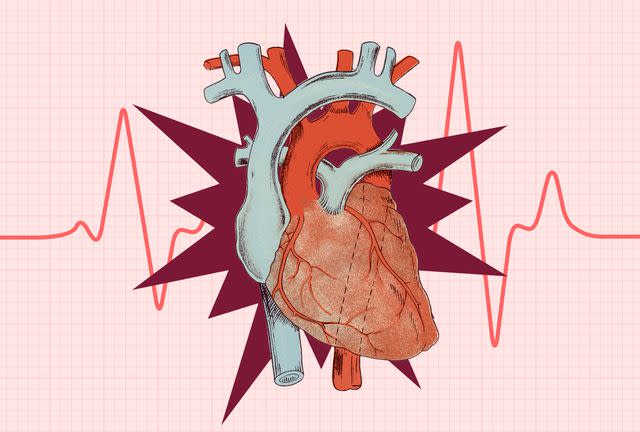The American Heart Association Just Redefined Heart Disease Risk—Here’s What You Need to Know
Kidney disease has been added as a risk factor for cardiovascular disease—and it’s more common than you might think.
Reviewed by Dietitian Jessica Ball, M.S., RD
The risk factors for cardiovascular disease (CVD) are well-documented—high blood pressure, high LDL cholesterol, diabetes, smoking and secondhand smoke exposure, obesity, unbalanced diet and physical inactivity, per the Centers for Disease Control and Prevention (CDC).
Now, the American Heart Association (AHA) has added another one: kidney disease.
An estimated 37 million Americans have chronic kidney disease, a condition that prevents the organs from functioning properly. And 9 in 10 people with the condition don’t even know they have it.
According to a newly released statement published in the journal Circulation, researchers have found an overlap between various aspects of CVD, kidney disease, type 2 diabetes and obesity. And, for the first time ever, the AHA has defined the overlap between these conditions as cardiovascular-kidney-metabolic syndrome or CKM.

Getty Images
Why Does This Matter?
According to the AHA, 1 in 3 adults have three or more risk factors for cardiovascular disease, metabolic disorders and/or kidney disease. Because of the overlapping nature of CKM, it includes many bodily systems and affects nearly every major organ in the body, including the heart, brain, kidneys and liver. This makes it extremely critical and life-threatening in its later stages. Evidence also suggests that CKM syndrome is progressive and begins early in life—which means it can be caught early.
Because of this, the new advisory stresses the importance of primary care providers screening every person to find their baseline stage—even if the stage is 0, meaning no risk factors. Each progressive stage—from 1 to 4—exponentially increases one’s risk of cardiovascular disease.
In an AHA press release, Chiadi E. Ndumele, MD, Ph.D., M.H.S., FAHA, chair of the committee that proposed this advisory and an associate professor of medicine and director of obesity and cardiometabolic research in the division of cardiology at Johns Hopkins University, states that the focus of this advisory is on identifying people in the early stages of CKM syndrome.
“Screening for kidney and metabolic disease will help us start protective therapies earlier to most effectively prevent heart disease and best manage existing heart disease,” says Ndumele in the press release. “We now have several therapies that prevent both worsening kidney disease and heart disease. The advisory provides guidance for health care professionals about how and when to use those therapies, and for the medical community and general public about the best ways to prevent and manage CKM syndrome.”
These researchers suggest that adults who fall within a stage 0 risk factor level get screened every three to five years to assess blood pressure, triglycerides, HDL (beneficial) cholesterol and blood sugar, and yearly to assess waist circumference and BMI.
How To Reduce Your Risk of CKM Syndrome
The AHA recommends its Life’s Essential 8 as a framework for people to use to prevent disease. The areas it focuses on include health behaviors—eating a balanced diet, being more active, quitting tobacco and getting healthy sleep and individual health factors such as managing a healthy weight, cholesterol, blood sugar and blood pressure.
Simple nutrition tweaks to reduce your risk of CKM include loading up on fiber from a variety of whole grains, fruits and vegetables, reducing your sodium intake, cutting back on added sugar consumption, including plenty of lean protein and ramping up your intake of unsaturated fats.
The New Mediterranean diet has got all these bases covered. And we’ve put the information together to make it easier for you to make these changes to your lifestyle.
The Bottom Line
Adding kidney disease to the lineup of risk factors for CVD makes sense since there is so much overlap between CVD, kidney disease, type 2 diabetes and obesity. The important thing is to be proactive in your prevention efforts. See your healthcare practitioner and get screened. Make the sustainable tweaks to your eating pattern to help it better support your heart and kidney health. If you’re not already active, get moving in ways you enjoy. If your sleep patterns are inconsistent, try to identify why and make the necessary changes. Manage what’s stressing you out, and talk to a professional if you need help. While genetics do play a role in your risk factors for disease, there is still a whole lot you can do to reduce this risk and increase your chances of living a long, healthy life.
Read the original article on Eating Well.

